On May 16, 2017, Ukrainian users on the Russian social network “VKontakte” got a worrying message from the site administrator. Illegal content, such as pirated music, movies without introductory ads, and tons of funny pictures have been officially prohibited by the Decree 133/2017, signed by the president on May 15. In addition to the popular social networks, the government also banned all Yandex services, Odnoklasniki.ru, Kinopoisk, as well as Kaspersky antivirus, the Mail.ru email service, and even the accounting program 1C.
Is there a replacement for Russian websites?
Ukrainian users divide themselves into two camps. For some, it is better to “forgive and forget”: to install TOR, VPN or Opera and continue to use Russian content. Others suggest “punishment and replacement” – in other words creating alternative Ukrainian versions of Russian social networks like “Vkontakte” and “Odnoklasniki”.
We decided to sign up for six Ukrainian social networks that recently made a lot of noise. Each had its own draw ranging from rare albums of national singers, money for posting, mature content, or patriotic motifs in order to attract the newly liberated Ukrainian user.
UkrOpen
Domain registration date: 9 July 2015
Server registration: Ukraine, Dnipro
Developer: Igor Harchenko, 47 years old
At first, you’re not sure how to comprehend UkrOpen. One gets the impression that developers just never came to a consensus about what the final version of the network should look like, whom it targets, or really what the point behind its existence should be. Some people call it the network “by Ukrainians for Ukrainians”, which in principle the very name of the network declares, especially if it is pronounced aloud and merged. Others call the site a “news portal”, but the creators on the front page of the site assert that this is all trivial and that instead the most important feature on the network is only that its interface was created from scratch and is unique.
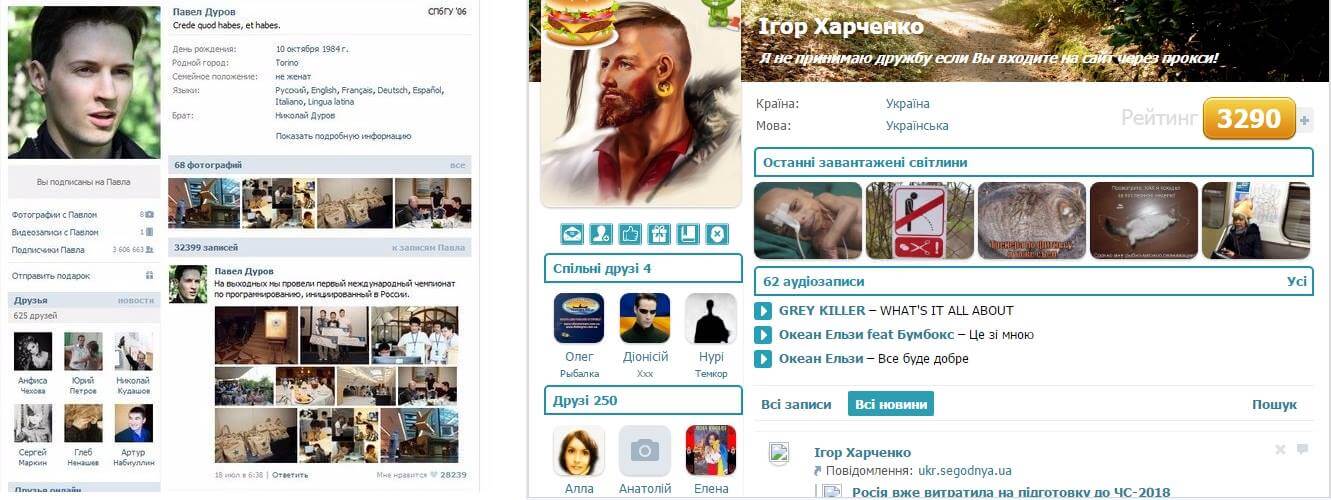
UkrOpen network is used by only a couple of thousands of users.
Registration on the social network does not require a phone number; an email and any name, fictitious or real, is enough. Despite the fact that in UkrOpen warns that email addresses from Mail.ru and Yandex are explicitly prohibited, you can use them to register without any problems.

There is practically no content on the site. The “video” section is categorized and then further divided into subcategories. In the “Documentary video” section there is only one video, “Arresting Putin in 2017”. In “Useful” – a talk show “Healthy Thoughts”, discusses tips for creating your own business and a Ukrainian man, in not the nicest language, congratulates the President of the Russian Federation on his birthday. The rest are about the units of the Right-wing Radical Party “National Corps” and church sermons from the American preacher Mark Gangor about sexual sins. But the most interesting thing is access to the 18+ video. And these include films, clips with naked women, rap singers with cool cars, and thoughts about sister nations. Audio recordings, like the video, bypass all existing copyright laws. So, without any restrictions, you can pour any amount of music onto the site.
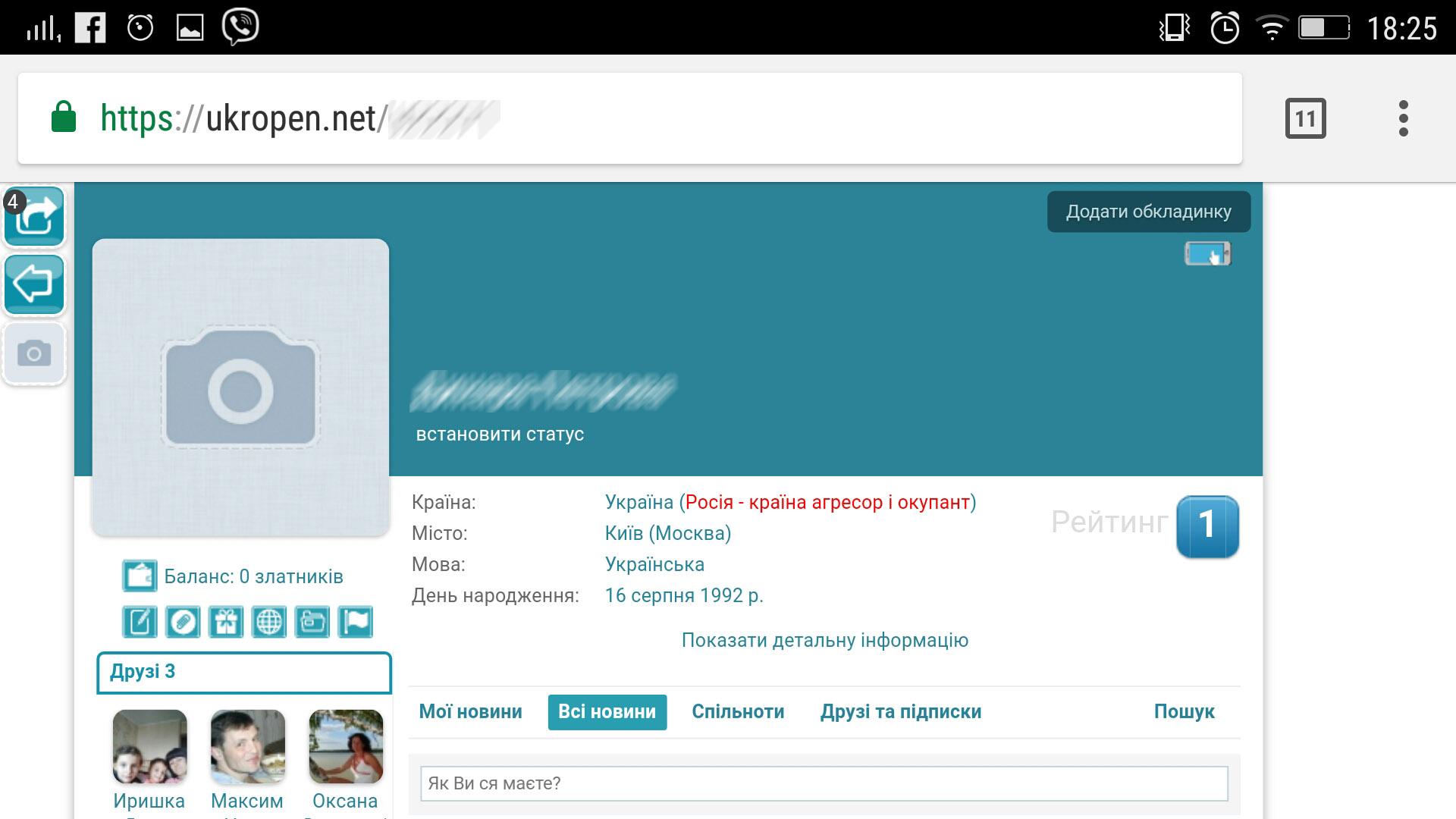
Access to the site is also open to Russian users. However, when you log in to your account from a Russian IP-address, your page is labeled with “a sign of shame.” And next to the city of residence there is an automatic refinement to “Moscow”. As it turns out, it is impossible to remove the mark even from a Ukrainian IP.
Ukrainians
Domain registration date: 16 May 2017
Server registration: USA, Denver
Developer: StartupSoft, Canada
In keeping with the theme of national segregation implied by the project’s name, Ukrainians is really the least similar to existing social networks.
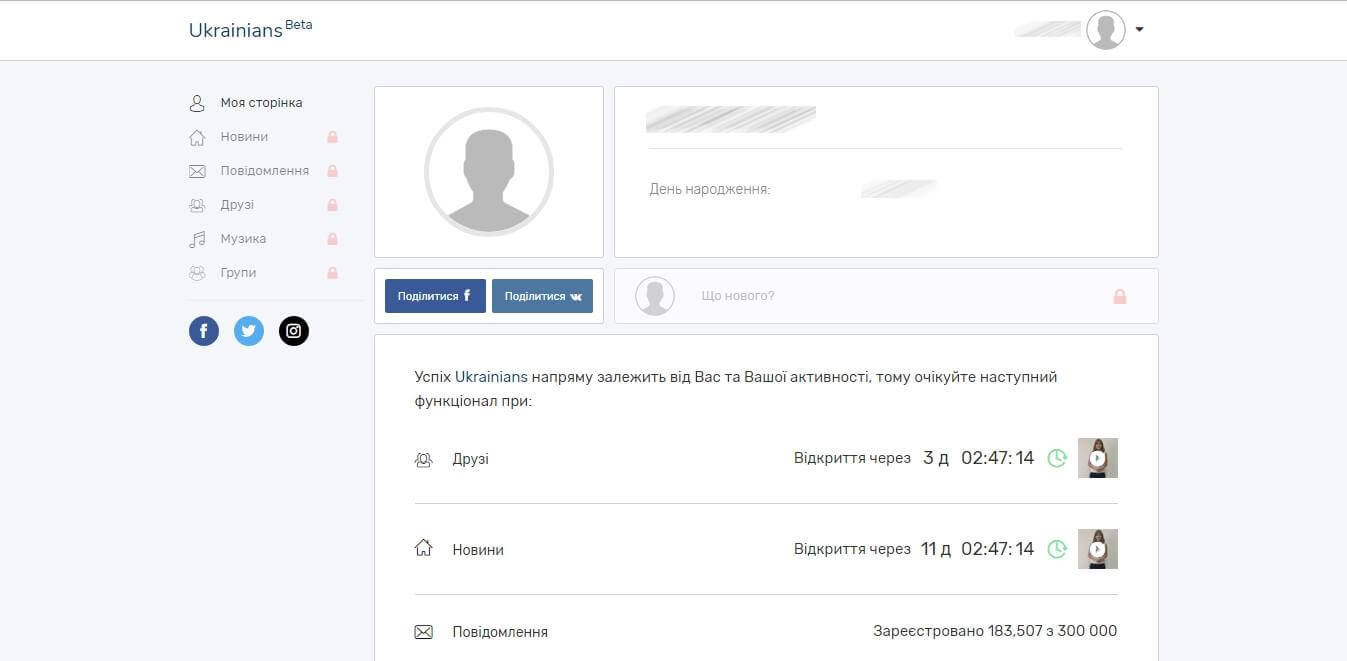
The Canadian-Ukrainian project started on June 3 this year, and in just a couple of weeks, it registered more than 180,000 users. There is no content on the network and you can’t write messages or add friends. The developers assert that the network will be fully operational only after 300 thousand subscribers. And to continue to incentivise Ukrainians to register the creator, Alexander Strumchinskaya, has promised to pay money for the most popular posts on the network. How much, in what currency and how – is still unknown.
Ц.укр (Tsukr)
Domain registration date: 11 March 2014
Server registration: Ukraine
Developer: Mikhail Grinenko, 26 year old
If you’ve ever imagined how a hyper-patriotic version of Vkontakte would look like, then you would automatically recognize Tsukr with its black interface and nationalistic logo. The name of the network can be deciphered in two ways: it is either Tsukor (Sugar), or short for Tse – Ukraina (“This is Ukraine”). Its creator – Kyivan Mikhail Grinenko, is 26-year-old, and that’s all the information on his page. What’s troubling is that the developers video collection is more like a collection of official declarations of Presidential Administration and Poroshenko`s statements.
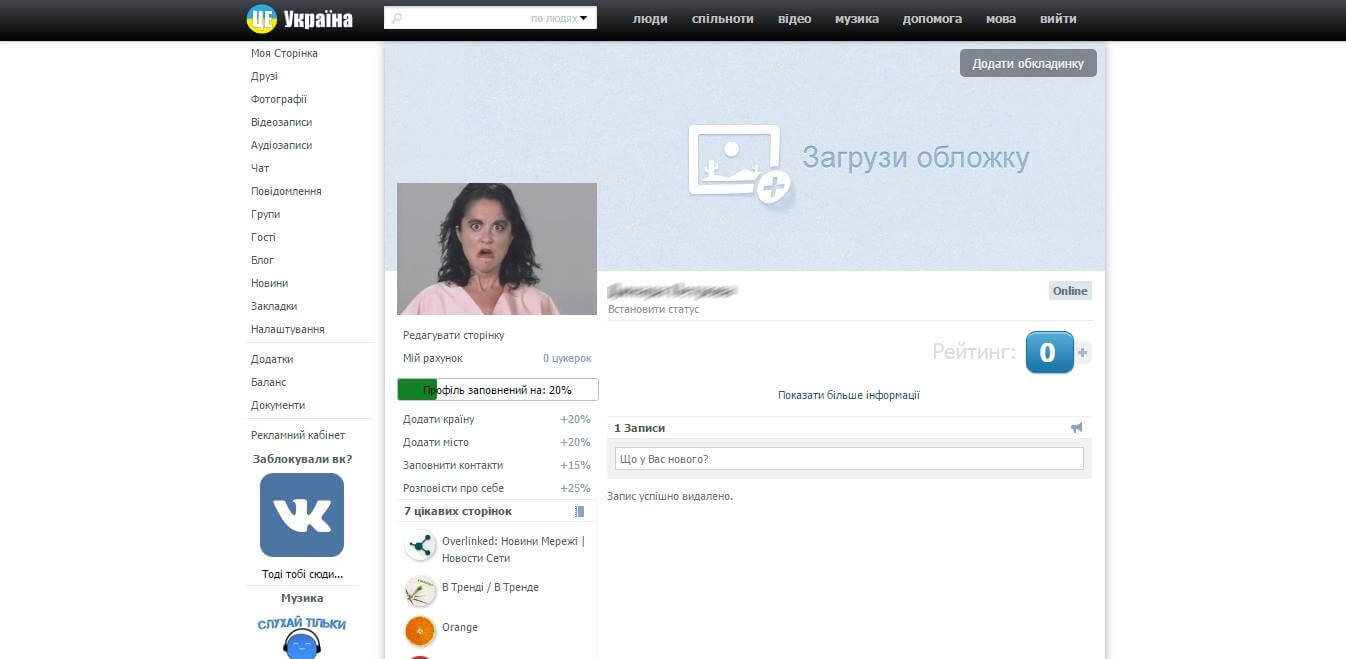
Outside the newly created social network, Mikhail Grinenko prefers to cast a short shadow by being modest and not giving interviews. To note the developer it is possible unless in comments under the articles placed in Internet resources. In online discussions of different years, Grinenko writes on behalf of not the creator, but the average user of the Ts.ukr network, praising the Ukrainian programmers and advertising the network to others.
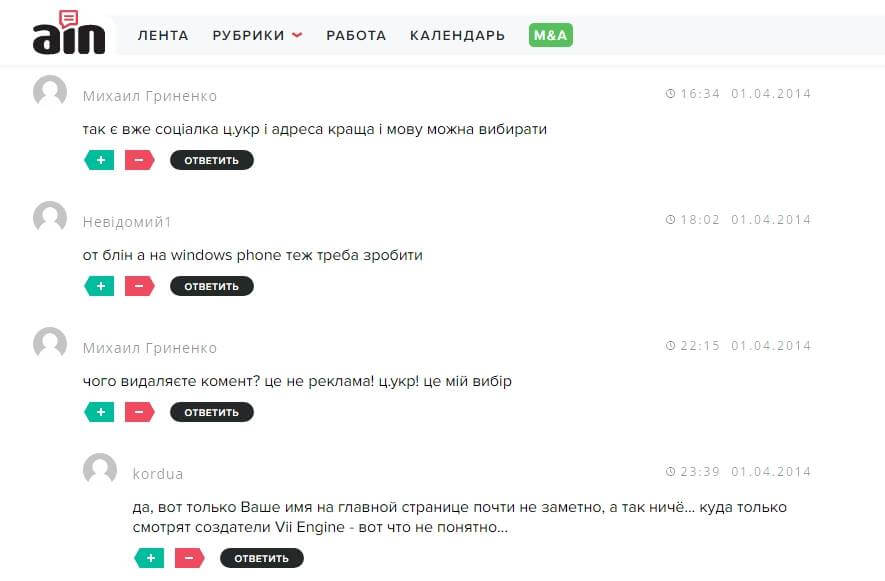
Perhaps, it was this sales pitch that turned out to be effective: today more than 300 thousand accounts are registered on the site, about 600 thousand audio records and 86 thousand videos. The only problem is that the function “Transfer all data from Vkontakte”, which was implemented to speed up registration does not normally work. The network either crashes, or loads the information partially, so in order to save your nerves and time it’s just better to create a new page.
UKRFACE
Domain registration date: 4 January March 2013
Server registration: The Autonomous Republic of Crimea (Ukraine), village Chistopolje
Developer: Server Pashiev,28 year old
When the site opens, the first thing that strikes the eye is that the slogan of this social network is remarkably similar to nationalist appeals from “patriotic” organizations: “The project was created for communication and gathering of the people of Ukraine. With new features and daily updates”.
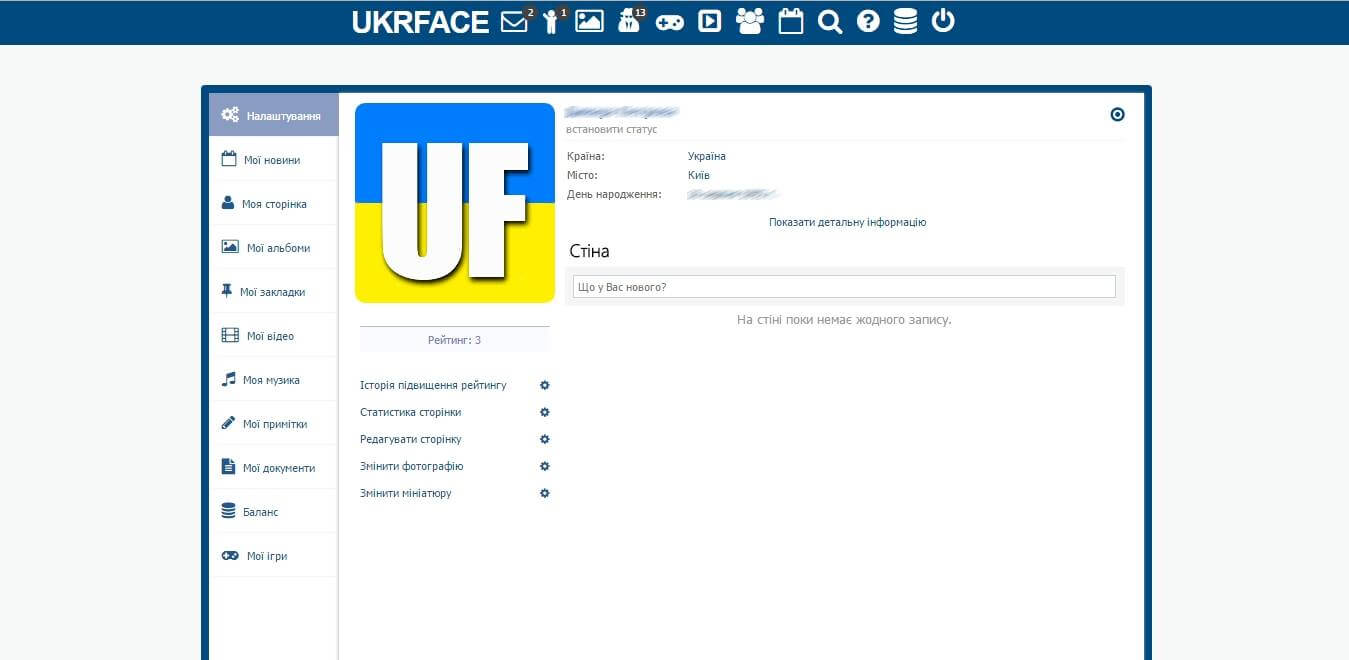
While the developers of previous sites did not think to ask what country you’re from, UKRFACE decides that this is matter worth clarifying. It offers beyond Ukraine, the Baltic countries, the US, and Russia. Additionally the interfaces from the rest of candidates are predominantly in Ukrainian, UKRFACE offers a choice of any of the most convenient languages, among which, by the way, is the Crimean Tatar.
Today over 42 thousand users registered in the network.
However, content is mostly added by users themselves. Here in video section you are suggested to evaluate things like “how I spent my prom” or “humdrum school life”. There are mot so many audio recordings in UKRFACE either. They are mainly Ukrainian singers and user tapes from personal gadgets.
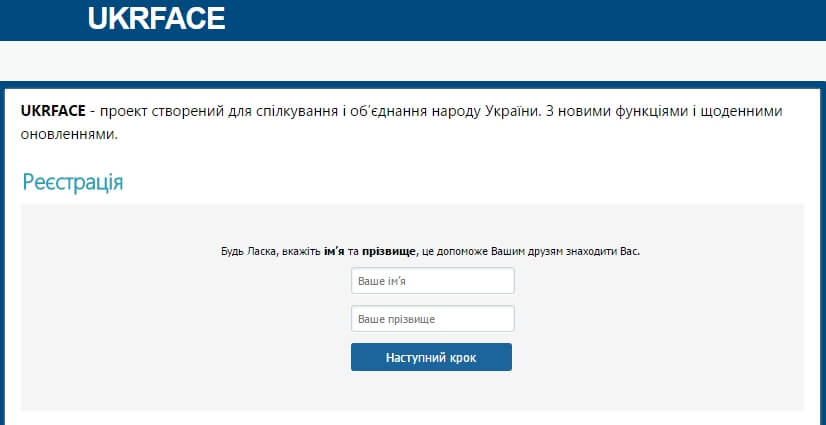
UKRFACE started 7 April 2014. Server Pashiev claims who lives in Kerch to be the “Project Founder” in social network. The other co-founder and Server’s brother – Enver Pashiev, according to the declaration of assets for the period of 2015 year, works at the Ministry Land and Property Regulations of the Crimean Republic.
InRepublic (WEUA)
Domain registration date: 29 July 2015
Server registration: Bahama Islands
Developer: Bohdan Oliyarchuk, 29 year old
InRepublic, better known as WEUA.info – was one of the first Ukrainian social networks. It was founded during Euromaidan at the beginning of 2014. From that moment, the network has been the victim of several different schemes and scandals. Founder Bohdan Oliyarchuk has been accused of embezzling charitable contributions, assault, and there are even whispers of cooperation with Russia. In the autumn of 2014, a conflict between the two online-platforms WEUA.info and WE.UA raged over the title of “the most patriotic social network”.
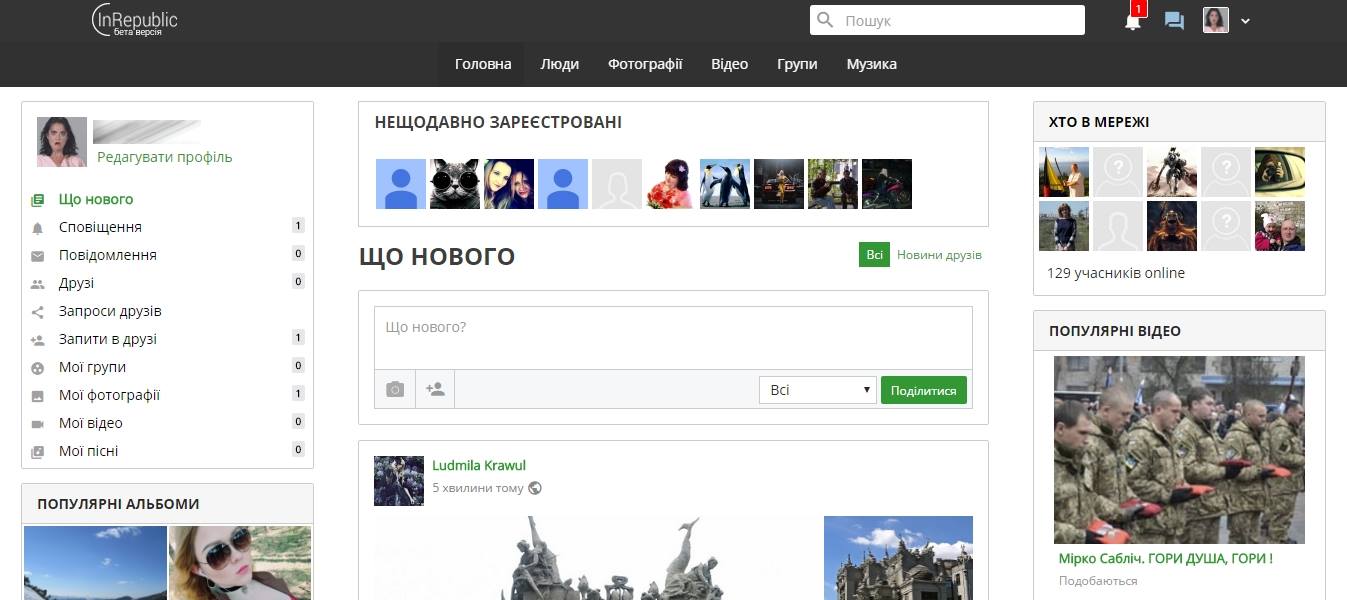
Nowadays, site WE.UA is blocked and WEUA.info has been reorganized into InRepublic and also has dropped its previous blue-yellow patriotic design in favor of a Privatbank brand green with black title bar.
The data on the total amount of InRepublic users could not be found anywhere. Developers stopped counting in 2014. At the time over 200 thousand users were registered.
Vsi tut
Domain registration date: 17 October 2014
Server registration: Ukraine
Developer: Data unavailable
If previous platforms are predominantly full of young people, behind the illustration of joyful Ukrainian family dressed in vyshyvanka, placed in front page of the platform Vsi tut, mainly users from 40+ group. Top-trends for discussion – an unstable political situation, Russia’s aggression and assistance to ATO fighters. What is not a great surprise, as the network Vsi tut was created in winter 2015 as a place for gathering of patriots of Ukraine from different countries.
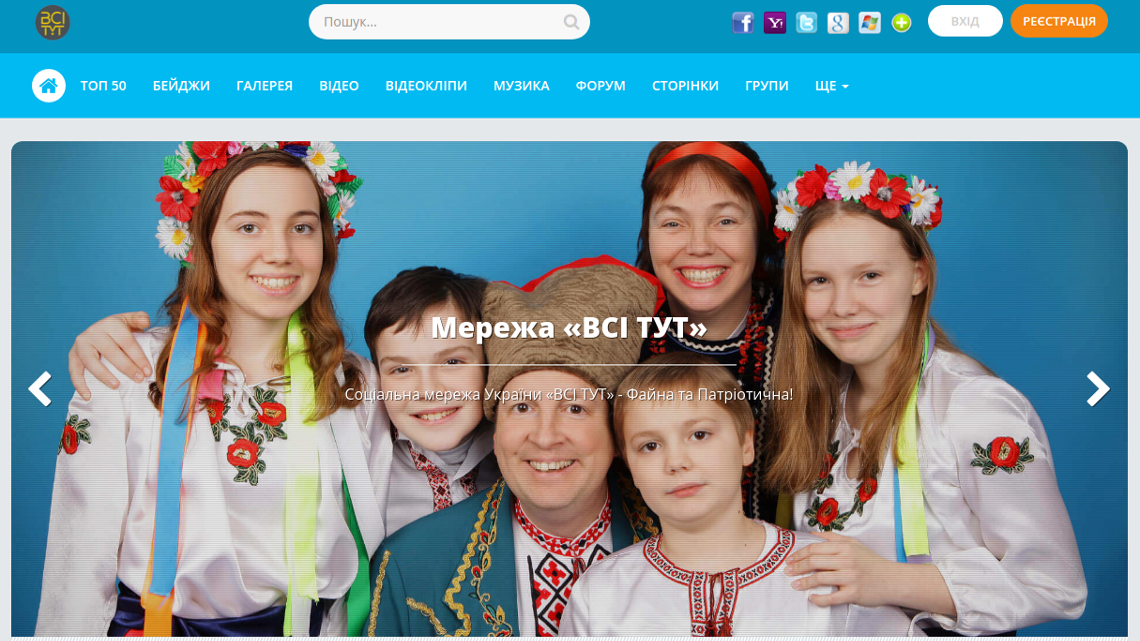
Interface of the front page is more like a news portal with banner ads of smartphones for half a page that change to posters about “traditional family values.” But the section “Search friends” could easily have been taken from a dating site.
If you did not come here to meet someone, and the theme of the Ukrainian military does not suit you, the only thing that you can do on Vsi tut is to listen to patriotic playlists with songs from popular Ukrainian performers. In the video section, you can learn embroidering, cooking, or about the cultural heritage of Ukraine.
The site does not indicate any info about how many people use the social network. But as for the group of volunteers who created the platform, they claim themselves to be “not dedicated to any political parties, clans or communities” mentioned on the site.
Without FSS supervision
To find out whether the preferences of Ukrainian users have been changed, marketing experts have already undertaken some studies on the popularity of these sites. For example, according to data from the Ukrainian branch of the Center for Marketing Research of TNS Kantar, the Ukrainian internet audience between 14 and 70 years old today is 19.8 million. Among them, 78% were users of the VKontakte, 54% preferred Facebook, 62% had mailboxes on Mail.ru and 46% were registered to the Odnoklassniki network.
According to TNS Kantar the situation has not changed much. Facebook’s audience increased by 7%, which is more than 788 thousand new users, only 2% – 334 thousand Ukrainians left VKontakte, and the Odnoklassniki network also lost 2% of its audience. But in May, the new member leader was browser Opera with integrated VPN. Previously, before the ban on Russian networks, this browser was used by about 380,000 Ukrainians, but its popularity increased and its Ukrainian audience has reached up to 3 million people.
Among other mobile applications, applications with VPNs (Virtual Private Network) and other anonymizers that hide the user’s IP address have also become increasingly popular. But as for Ukrainian social networks competing with Russian ones, they were not of special interest to internet users.
According to an interview of the Deputy Head of the Department for the Cyberpolicy of Ukraine Alexander Palamarchuk, the department is already aware that most users simply decided to ignore Poroshenko’s decree and install anonymizers. Officials also add that to make Ukrainians learn how to abide the law, special mechanisms are being developed in the country that will block access to prohibited sites in the future. But what are these “mechanisms”? The police did not reveal their secret.
There is nothing left but to make guesses. It might be a blockage of TOR and VPN, like the one now being proposed by State Duma of Russia. Perhaps, following China’s method, Ukrainian officials will create a national traffic analyzer like DPI (Deep Packet Inspection), which will disclose your real country and IP, from which you violated the law and turn that information over to police. Maybe even, they will introduce a Turkmenian-style prohibition — just block the network protocols which VPN and other anonymizers require in order to function.
But why try so hard? Just remember the golden rule: no Internet = no VPN and no TOR. This solves all our problems. There will be no Russian propaganda in Ukraine and no lidless eye of the Federal Security Service behind our backs. Temporary radical measures of this kind have already been used in unstable political circumstances by such countries as Libya, Syria, Sudan and Egypt. Meanwhile, North Korea has no internet at all, nor does it intend to bring it in; after all, it helps to preserve the people’s belief in their government and keeps their eyes healthy.
Translated by Nick Starkov
![Political Critique [DISCONTINUED]](http://politicalcritique.org/wp-content/uploads/2015/09/Political-Critique-LOGO.png)
![Political Critique [DISCONTINUED]](http://politicalcritique.org/wp-content/uploads/2015/09/Political-Critique-LOGO-2.png)